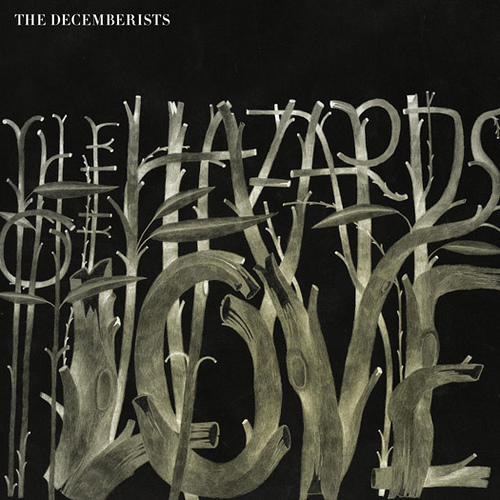Colin Meloy has always worn pretension as a badge of honor. As frontman and primary songwriter for the Portland, Oregon indie-pop quintet the Decemberists, Meloy has made his name writing hyperliterate lyrics about things like chimbley sweeps and barrow boys. The Decemberists’ critically acclaimed 2006 major-label debut, The Crane Wife, paired a narrative loosely based on a Japanese folktale with a musical aesthetic indebted to early 1970s progressive rock giants like Yes and Genesis. The group’s fifth album, The Hazards of Love, is its darkest and most ambitious yet, a full-blown rock opera that was intended to be a stage play until certain plot elements made it literally unstageable.
Like all great rock operas from Tommy to American Idiot, Hazards’s plotline is completely ridiculous. The Decemberists’ own press release announces the arrival of “the tale of a woman named Margaret who is ravaged by a shape-shifting animal; her lover, William; a forest queen; and a cold-blooded, lascivious rake.” If you want to go through the lyric sheet and put a story together, knock yourself out. In addition to Meloy’s own distinctive nasal croon, the album’s characters are voiced by indie icons Jim James, Robyn Hitchcock, and Shara Worden, making Hazards feel like the play it was written as.
The Hazards of Love is in many ways the Decemberists’ answer to Tales From Topographic Oceans, one of the most legendarily polarizing albums in rock history. Whether you view Yes’s 1973 opus as prog rock’s final plunge off the deep end or its absolute pinnacle will likely inform your view of Hazards. The album is long and dark, 17 interspersed prog-folk song fragments, without much in the way of discernable hooks. A lot of times an album will be described as “one of those albums meant to be listened to in its entirety,” but there is, quite literally, no other way to experience this one. It’s wise with Hazards to pay attention to the sound rather than the songs, because the album works best when viewed as an extended mood piece.
The Decemberists are in full-on ‘70s rock mode on Hazards. Meloy and guitarist Chris Funk channel “The Battle of Evermore” on the opening title track, and Jenny Conlee’s organs on album highlight “The Queen’s Rebuke/The Crossing” are pure Deep Purple. “The Wanting Comes in Waves” starts off almost like a normal Decemberists track, before abruptly shifting gears for some retro-blues pyrotechnics that could have come from Jack White. And for all the album’s theatrical pretensions, Meloy’s wit is as sharp as ever—check the brutal child-rearing condemnation in “The Rake’s Song”.
The Hazards of Love should, above all else, quell fears that the Decemberists would play it safe now that they have some major-label success under their belts. This is a difficult album, one that requires a considerable investment of time to figure out. It’s an album that will spark debate among fans for months, even years to come, as to whether this investment pays off. Ultimately, Hazards succeeds through Meloy’s melodic smarts and his band’s constantly maturing compositional sensibilities.

